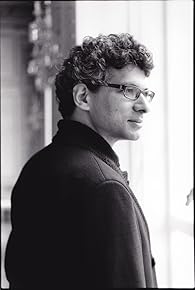Goodbye earworms, hello Keeril Makan
Nothing clears the mind of overplayed Christmas season tunes – popularly known as earworms -- like an hour in the company of Keeril Makan’s music. His new CD, Afterglow, is as refreshing as a glass of cold Chablis.
Makan is the respected American composer, now an assistant professor at Massachusetts Institute of Technology, who once famously said he wants to explore the continuum between noise and pure sound. This CD (Mode 257) has a fair amount of both, with nods to John Cage and Edgard Varèse. His unusual instrumentation in some of these six pieces does not bring him down to earth, however. For his technique is to “poke” an instrument, looking for “a squawk, a cry, anything”, as he says in his introduction to this collection.
The image fits. Flute-oboe-harp combinations contend with percussion (bells, cymbals), bass clarinet, trumpet, double bass and others to create his unexpected results. He works by improvisation, like many new music composers, trying out sounds and following them into the realm he seeks. Robert Kersinger’s excellent program notes acknowledge a certain strangeness in the music of this CD but encourages us to “accept immersion in (Makan’s) unique emotionally significant musical ideas”. I could not agree more.
The title piece, Aterglow, relies on pure piano—with strings neither prepared nor twanged. It opens with one of the most peaceful introductions in new music – a repeated middle C that is allowed after each stroke to decay into silence. The resonance of the piano does the rest, hence the title. Gradually more complex chords are then introduced until 13 minutes have somehow passed unnoticed. I have heard this piece in recital and observed an audience mesmerized. As pianist Ivan Ilic said, “Either you get it or you don’t.”
More jolting intros are supplied for Mercury Songbirds and Husk (Makan has a talent for naming his works). After Forgetting, conducted by Adam Silwinski with the International Contemporary Ensemble is led by a pulsing piano that brings in clarinet, violin, percussion and cello as the piece develops, always moving in tandem with the piano. Accessible to new music doubters, it represents Makan’s recent “gentle, open approach” to composing. He once told me the days of cerebral composition for its own sake are coming to an end. “Now the emphasis is more on attracting an audience”.
Makan is pessimistic however about U.S. trends in new music. Subsidies are drying up and suddenly rehearsal time is at a premium. Shorter, less complex pieces are becoming the way forward. His own 48-minute Letting Time Circle Through Us originally ran 48 minutes. To meet today’s constraints he trimmed it to 12 minutes. One yearns to pick up the rest from the cutting room floor and listen in peace.
---------------------------------------------------------------------------------------------------------------------------
Amazon.com about Keeril Makam:
Described by The New Yorker as “an arrestingly gifted young American composer,” and by The New York Times as “consistently stimulating,” The Boston Globe portrays Keeril Makan as a composer “whose music deserves to be more widely heard.” Recipient of a Guggenheim Fellowship and the Luciano Berio Rome Prize from the American Academy in Rome, he has also received awards from the American Academy of Arts and Letters, the Fromm Foundation, Meet the Composer, the Aaron Copland House, the Utah Arts Festival, the Fulbright Program, and ASCAP. His work has been commissioned by the Bang on a Can All-Stars, American Composers Orchestra, Harvard Musical Association, and Carnegie Hall, among others. His CDs, In Sound (Tzadik), Target (Starkland), and Afterglow (Mode) include performances by the Kronos Quartet, Either/Or, and the International Contemporary Ensemble. Persona, his opera, written for Alarm Will Sound and produced by Beth Morrison, is an adaptation of Ingmar Bergman’s classic film, with a libretto by Jay Scheib. Schott is publishing his compositions.
Makan was raised in New Jersey by parents of South African Indian and Russian Jewish descent. After training as a violinist, he received degrees in composition and religion from Oberlin and completed his PhD in composition at the University of California–Berkeley, with additional studies in Helsinki and Paris. Makan makes his home in Cambridge, Massachusetts, where he is Associate Professor of Music at MIT. For more information, visit www.keerilmakan.com
This article is brought to you by the author who owns the copyright to the text.
Should you want to support the author’s creative work you can use the PayPal “Donate” button below.
Your donation is a transaction between you and the author. The proceeds go directly to the author’s PayPal account in full less PayPal’s commission.
Facts & Arts neither receives information about you, nor of your donation, nor does Facts & Arts receive a commission.
Facts & Arts does not pay the author, nor takes paid by the author, for the posting of the author's material on Facts & Arts. Facts & Arts finances its operations by selling advertising space.

